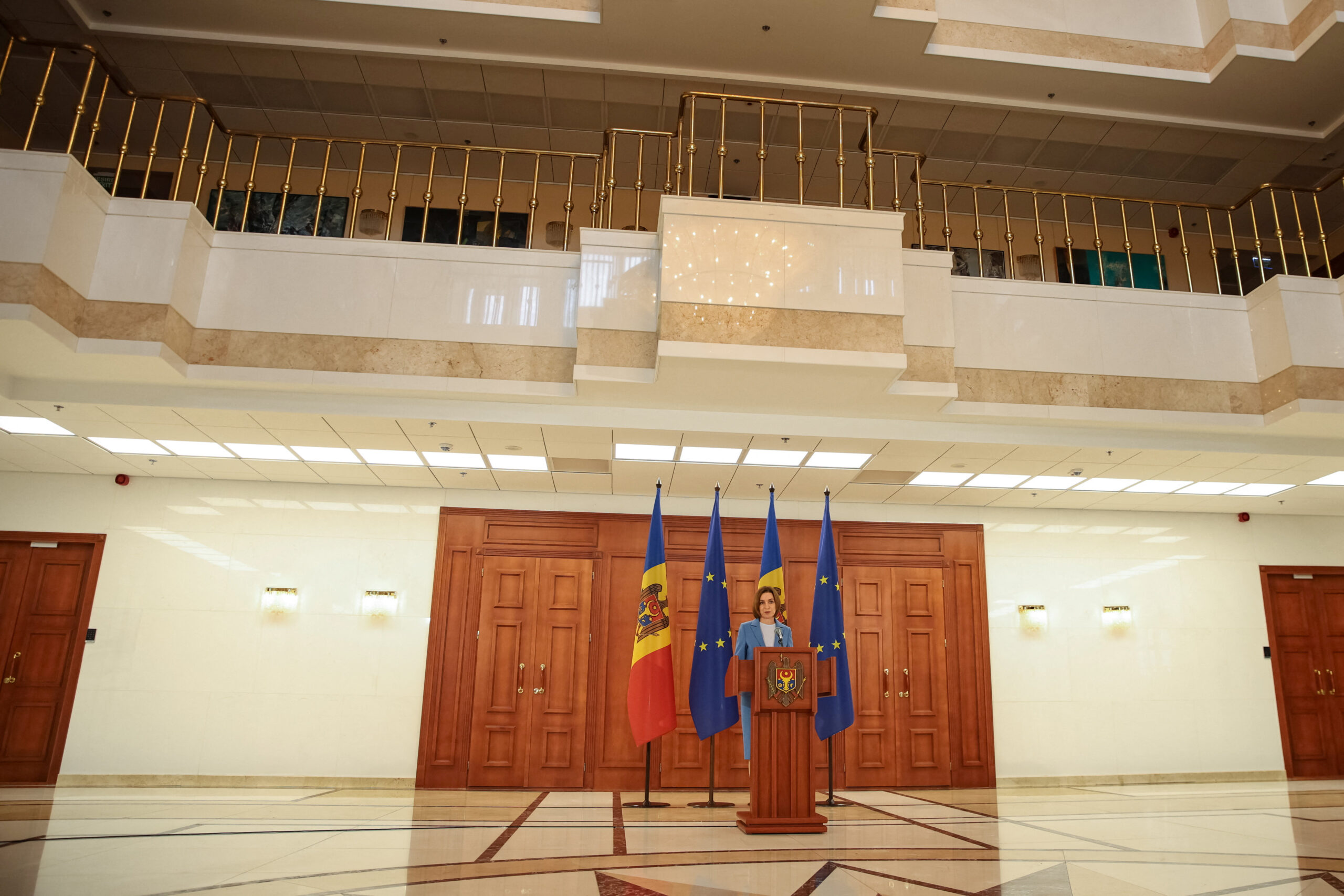Moldova emerged from the parliamentary elections on September 28 with greater confidence in its ability to counter Russian interference. The ruling party, the Action and Solidarity Party (PAS), was victorious, garnering 50.2% of the 1.6 million votes. With a majority of 55 parliamentarians in the 101-seat Parliament, PAS enables President Maia Sandu to rely on a stable government. To form the new parliament, the outcomes are expected to be validated by the Central Electoral Commission and the Constitutional Court. Previously, the Court was suspected of being co-opted by the PAS majority, which had appointed the constitutional judges shortly before election day. The election cancellation by the Court, influenced politically by PAS, was feared by the pro-Russian opposition if PAS failed to secure a majority. The disinformation infrastructure, vote-buying schemes, and cyberattacks were among the types of Russian interference that Moldovan state institutions emphasized the most. This did not prevent PAS from securing another electoral victory following Maia Sandu’s re-election as the country’s president in 2024. While recognizing that PAS promoted a geopolitical agenda—”the EU versus Russia" and «peace versus war» themes—during the elections, opposition forces have broadly accepted the results. Some attempts by the Socialists to protest the election outcomes the day after the election did not garner significant public support, except among members of the «Patriotic» Bloc. The police dismantled networks linked to the fugitive businessman, Moscow-based Ilan Shor, and imposed fines for electoral corruption to discourage participation in «paid» protests. For the EU, the election outcome suggests a predictable dialogue with Chișinău, whose EU accession talks are currently «coupled» with Ukraine’s. The Russian official stance, voiced by Foreign Minister Sergey Lavrov, is to deny the legitimacy of the elections, signaling further interest in steering Moldova toward a political change that benefits Russian interests.
A Distinct PAS-Led Majority, a More Assertive Opposition?
The electoral victory of PAS means that political forces advocating moderation in their dialogue with the EU will remain in the opposition. Unlike the old parliament, the renewed one will comprise more opposition political parties that will challenge the ruling party. Consequently, the new four-year majority run by PAS will have to invest more energy in securing synchronized cooperation with the executive branch, which the Presidential Office dominates. The «Patriotic» Bloc (26 seats), the «Alternative» Bloc (8 seats), «Our Party» (6 seats), and the «Democracy at Home» Party (6 seats) form a diverse parliamentary opposition. To distinguish themselves from one another, they will be competing both with PAS and with the rest of the opposition parties. As a result, the Moldovan legislature is expected to become more dynamic, moving away from the somewhat stagnant period for democratic parliamentarism (engaging debates, consensus-building efforts, etc.) of recent years, when a single party dominated over the opposition bloc of the Socialists and Communists.
The «Patriotic» and «Alternative» blocs each comprise three political parties. Whether these blocs will remain united is still uncertain. If they split, the Moldovan parliament will be one of the most heterogeneous in its history, featuring numerous political groups alongside the ruling party, PAS, and two opposition forces: «Our Party» and «Democracy at Home.» This diversity will render the legislature a vibrant entity, with elements of unpredictability. In contrast, PAS will present a relatively monolithic image, except for Dinu Plângău and Stela Macari, who belong to the Platform «DA» Political Party but joined the PAS electoral list to mobilize the pro-EU vote. There are strong indicators that the new parliament will be impacted by situational alliances across the two blocs and two political parties, «with» and/or «against» PAS. To avoid uncertainties that can create discomfort for the Presidential Office, PAS will need to demonstrate greater discipline.
Given the high likelihood of EU accession negotiations beginning soon, PAS must secure at least 51 votes to counter potential blocking strategies by opposition forces. Made up of politicians with varying degrees of Euroscepticism, the opposition will unite against draft bills they see as delegating «sovereignty» to Brussels. As a result, PAS does not enjoy the same level of comfort it had during its previous tenure. Without a proactive approach to advancing the pro-EU agenda, it may lose its monopoly over the «EU vector,» which helped secure votes from the pro-EU segment of the population in the recent elections.
Bridging with the EU, «Gluing» Society
The renewed configuration of the Moldovan parliament sends a strong signal that PAS will continue to steer the ship toward the EU. This is linked to the EU integration process, the € 1.9 billion investment package from the European Commission to address Moldovan economic needs, and sectoral cooperation in other areas, including those related to Ukraine (sanctions on Russia, infrastructure development, refugees, and future reconstruction).
Fixing the economy, alleviating the living conditions of the most vulnerable categories, and implementing reforms (public administration, customs service, anti-corruption agency, etc.) are essential to-do list items for the future PAS-led government. Appointments to state institutions will need to be based on merit, depoliticized, and the legislative process fully transparent—something the PAS government somewhat neglected over the previous four years. Situations similar to when 79 draft bills were adopted in a single day, such as on July 10, 2025, or when the Central Electoral Commission was deemed politically influenced, as specified in the 2023 OSCE/ODIHR report, should be avoided to restore public trust in state institutions.
The outcome of the elections revealed deep divisions. The country’s vote count favored the opposition with 49.4%, compared to 44.1% for PAS. Votes from the diaspora (218,503 votes), primarily in the EU, contributed to PAS securing 50% of the total votes. However, the diaspora’s votes might have been influenced by the decision to open only two voting stations in Russia, specifically in Moscow (4,109 votes), compared to 75 in Italy (80,103 votes). The limited number of stations in Russia was attributed to security risks. The real reason was the perceived risks of voter busing by Shor to sway the overall election results. Overall, the decisive nature of the vote in the diaspora reflected the pattern seen in the 2024 referendum, following which the EU accession was incorporated into the constitution (Article 140(1)). The constitutional change was driven by a narrow victory for the «yes» side (50.35% compared to 49.65%), aided by votes from overseas (180,000 votes).
Where Can Russia Strike Again?
Relations with Russia seem irreparable at the moment, given the hostile actions it has taken against the Moldovan government over the past four years, particularly in the electoral arena. One of the main non-state actors acting as a «destabilizer”—the fugitive businessman Ilan Shor—operates from Moscow. His political parties, operating under the «Victory» Bloc, were active during the electoral campaign (small-scale protests, public statements, etc.), despite being excluded from the competition. Despite the sanctions, the «vehicles» of influence (Eurasia Foundation, political projects, media outlets that migrated online, etc.) used by the Shor-Moscow tandem cannot be effectively halted; instead, they will adapt to the harsher operating conditions in Moldova.
Finding a way to counter the impact of Shor’s activities on Moldovan politics, with Moscow supporting him, is vital for Chișinău if it aims to improve its image in the Gagauz autonomy, where only about 3% (1,825 votes) backed PAS during the recent legislative elections. The elections this year for the Gagauz legislative body—the People’s Assembly—will serve as the first test for PAS in countering Russian influence, coordinated by Shor in the Gagauzian autonomy. If combined with the elections for the executive, and if the seven-year prison sentence against the bashkan of Gagauzia, Evghenia Gutul, remains unchanged, PAS has a unique opportunity to reshape the political landscape in the Russia-leaning region through transparent elections. With the Shor-linked political network remaining under a continuous electoral ban, the political forces within the «Patriotic» Bloc will hold an electoral advantage over others. Repeating the blocking of a newly elected Gagauz bashkan from joining the government, as President Maia Sandu did against Gutul in 2023 due to affiliations with the Shor party, will fuel Russia’s narrative about the discrimination of the Gagauz minority.
Another vulnerable point where Russia could strike is the Transnistrian region. The residents of the breakaway region were antagonized against Chișinău after various measures by the Moldovan authorities hindered greater voter participation. The beginning of repairs to all bridges connecting the region with the rest of Moldova ahead of the elections, the reduction of voting stations from 30 to 12, and the change of addresses for five individuals caused a decline in the participation rate. Unlike the 2024 presidential elections, which saw around 28,000 votes from Transnistria, the turnout in the legislative elections was limited to about 12,000. The intentions that can be deduced from Chișinău’s actions revolve around preventing a mass vote for a pro-Russian political force from occurring. The complicated access to voting for the population in Transnistria has been used by Russian official propaganda to question the fairness of the elections and fuel the divisions between Chișinău and the Transnistrian residents. The restriction of voting rights in Transnistria will put Moldovan authorities at a disadvantage in their future attempts to win over «the hearts» of the population in the region. The political regime in Tiraspol struggles to survive the economic and energy crisis, with the region’s budget being 27% lower in September 2025 compared to the same period in 2014. To divert attention from its failure to support Transnistria, Russia is using the Moldovan elections to portray Chișinău as a hostile actor that is not embracing the voters from the separatist region.
The victory of PAS will continue the tradition of a pro-EU majority in the Moldovan parliament, which is encouraging news for the EU and Ukraine. Leaving behind the election-driven geopolitical discourse, the new PAS-led government must implement reforms based on meritocracy and depoliticization. It must seek ways to engage with the Gagauz autonomy to corner the Shor political network and inoculate the population in Transnistria with the idea of reintegration. However, the most crucial aspect of the ruling party’s governing agenda is rebuilding the country’s economic foundations. Falling behind in providing minimal economic benefits to its people not only opens the door to more Euroscepticism but also invites Russia to persist with «weaponizing poverty» through information campaigns and electoral manipulation, which risks weakening Moldova’s pro-EU aspirations.










